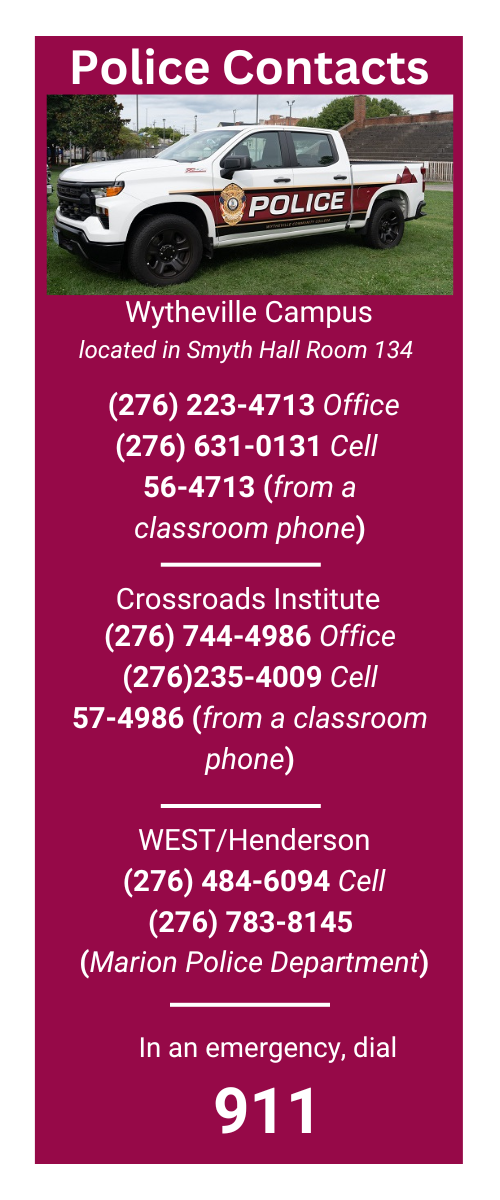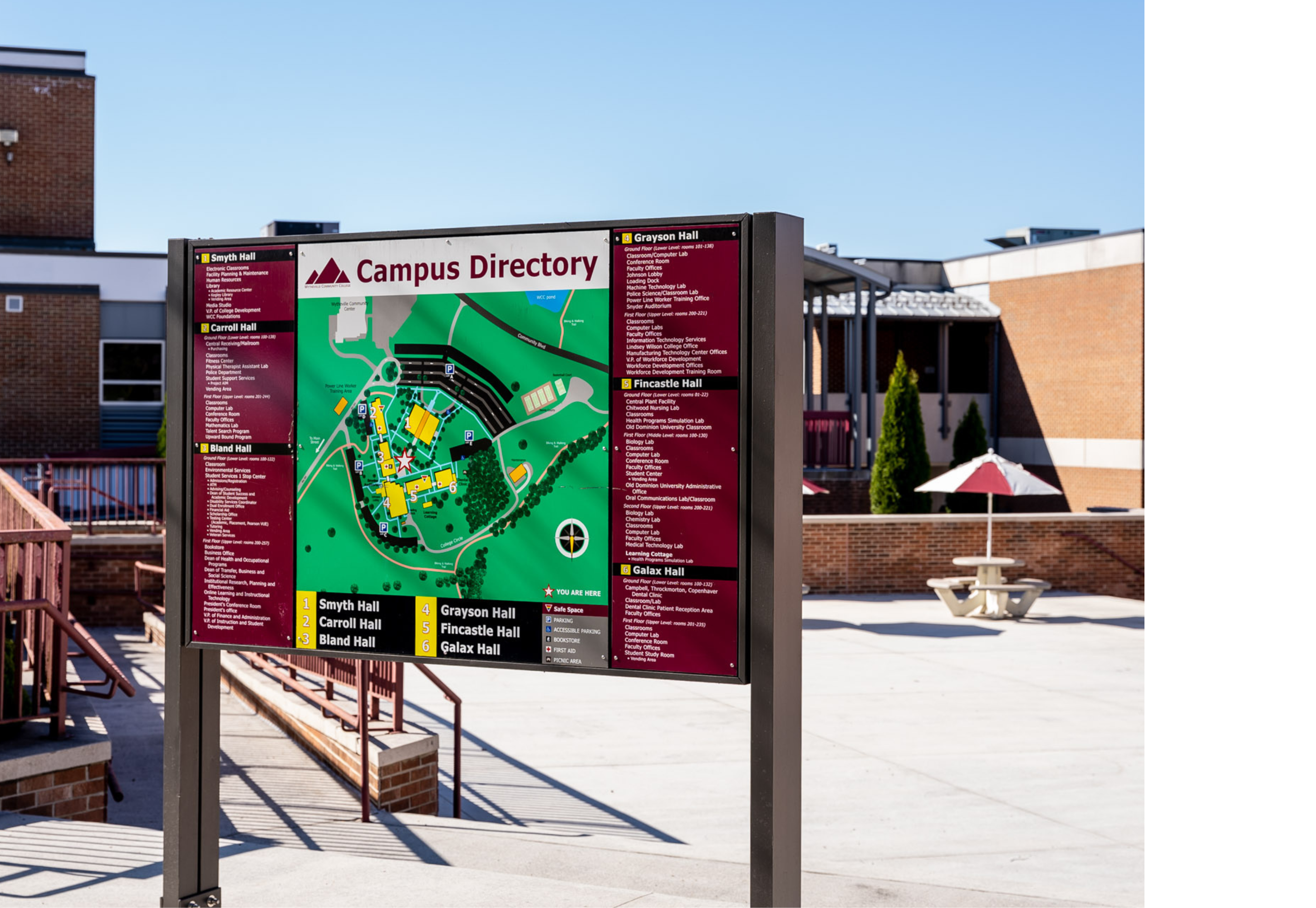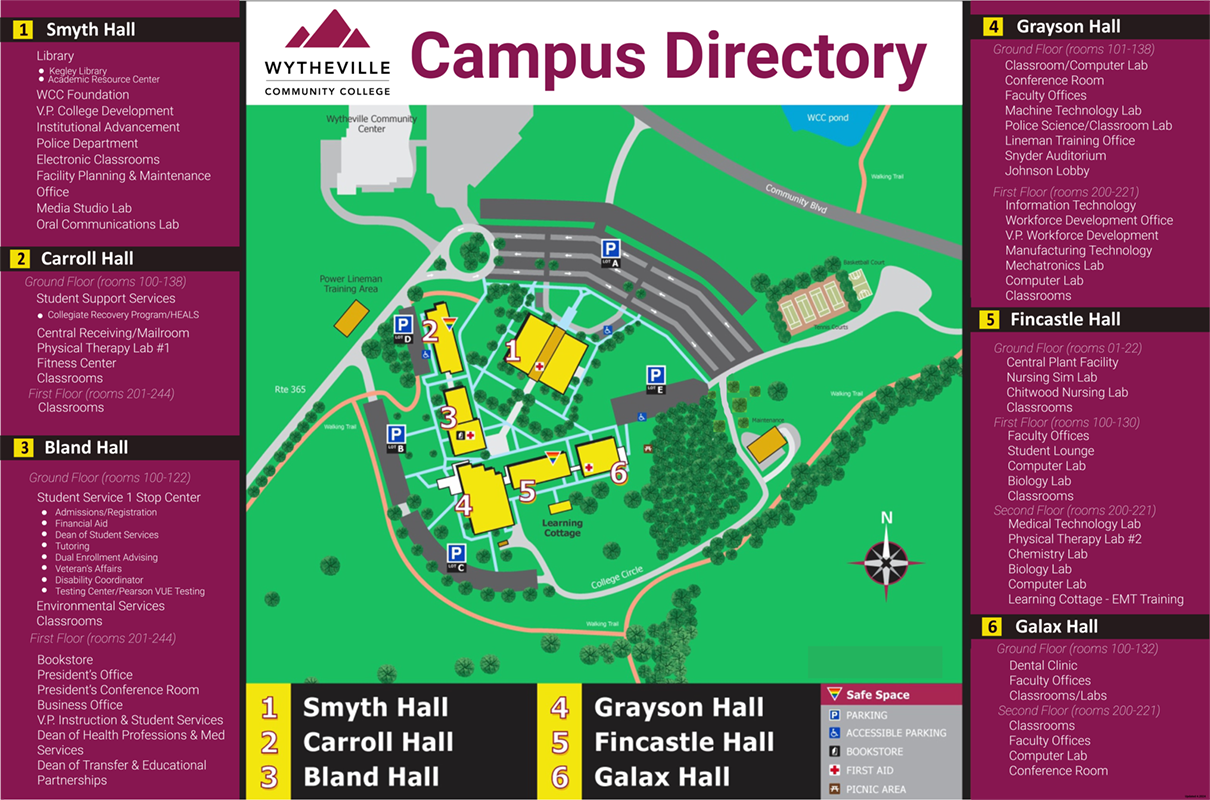
Safety at WCC
The Wytheville Community College Police Department is tasked with ensuring the safety and security of the students, faculty, and staff of our campus community. Our mission is to work effectively in deterring criminal activity so we may promote a safe and secure campus. However, as tirelessly as we may work, we understand that we cannot do this alone. Our campus community is encouraged to report instances of crimes, emergencies harassments, or suspicious activities immediately. View the WCC Safety Training Video here.
Reporting Crime
Community members, students, faculty, staff, and guests are encouraged to make an accurate and prompt report of all crimes and public safety related incidents to the WCC Police Department.
WCC Police Department personnel are on duty at the Wytheville Campus during the hours of 6:00 a.m. thru 10:00 p.m. Monday – Friday, and on Saturday from 7:30 a.m. to 5:00 p.m. Police Department personnel are on duty at the Crossroads location during the hours of 7:00 a.m. thru 10:00 p.m. Monday – Friday. However, in the event of a staffing shortage, and dependent on the activities scheduled at off campus sites, coverage may be adjusted to shift personnel to the Wytheville Campus as needed.
To report a crime or emergency on the Wytheville campus, the College Police Department can be contacted at (276) 223-4713, by the department’s cell phone at (276) 631-0131, or in an emergency dial 9-1-1. If calling from any college VoIP phone, dial 56-4713 to reach the Police Officer on duty. Non-emergency reports can also be submitted online here.

Exterior public telephones are located at one of the following locations on main campus:
- Carroll Hall: On the exterior wall to the right of the central entrance on the bottom floor.
- Grayson Hall: On the upper breezeway between Fincastle Hall and Grayson Hall on the exterior wall.
- Smyth Hall: On the exterior wall to the right of the main entrance at the front of the building and on the exterior wall to the left of the main entrance at the read of the building.
There are also VoIP phones located on every hall of each building which can be used to report an emergency. These phones have the police department phone number programed in the phone’s short cut menu buttons.
Crossroads Institute
To report a crime or emergency at the WCC Crossroad Institute location, contact the Officer on duty at (276) 744-4986, by the Department’s cell phone at (276) 235-4009, or in an emergency dial 9-1-1. If calling from any college VoIP phone, dial 57-4986 to reach the Police Officer on duty.
Marion Locations
To report a crime or emergency at the WCC’s Henderson or WEST location contact the Marion Police Department at (276) 783-8145, or in an emergency dial 9-1-1.
emergency at the WCC’s Henderson or WEST location contact the Marion Police Department at (276) 783-8145, or in an emergency dial 9-1-1.
All College Police Department incident reports are forwarded to the Chief of Police for review. If necessary, incident reports are forwarded to the Dean of Student Success and Academic Development and the College Threat Assessment Team for potential action. The College Police Department will investigate various reports when it is deemed appropriate.
SPARC Stalking Prevention, Awareness, & Resource Center
Wytheville Family Resource Center - (276) 625-0219
24-hour helpline: (800) 613-6145
Additional Phones:
- Wytheville: (276) 228-3522
- Galax: (276) 236-0364
- Marion: (276) 782-1608
WCC policy on stalking:
- Stalking: engaging in the course of conduct directed at a specific person that would cause a reasonable person to fear for his or her safety or the safety of others or suffer substantial emotional distress. For the purpose of this definition:
- Course of Conduct means two or more acts, including, but not limited to, acts in which the stalker directly, indirectly, or through third parties, by any action, method, device, or means, follows, monitors, observes, surveils, threatens, or communicates to or about a person, or interferes with the person’s property.
- Reasonable Person means a reasonable person under similar circumstances and with similar identities to the victim.
- Substantial Emotional Distress means significant mental suffering or anguish that may, but does not necessarily require medical or other professional treatment or counseling.
(taken from the WCC Annual Security Report)
Code of Virginia Title 23.1 Institutions of Higher Education; Other Educational and Cultural Institutions
Chapter 8. Health and Campus Safety
§23.1-808.1 Human trafficking awareness and prevention training; first-year orientation.
A. The governing board of each public institution of higher education shall develop and implement policies requiring that a human trafficking awareness and prevention training program be provided to and completed by all first-year students as a part of such institution's first-year orientation program. Such training program shall include trauma-informed training on the recognition, prevention, and reporting of human trafficking.
B. The Council shall encourage private institutions of higher education to develop and implement policies to provide such a human trafficking awareness and prevention training program as a part of their first-year orientation programs. 2023, cc. 30, 31.
National Human Trafficking Hotline
24/7 confidential help: (888) 373-7888
TEXT: BeFree (233733)
Report Hazing/Bullying Incident
Taken from the Code of Virginia.
§ 23.1-819. Definitions.
For the purposes of this article, unless the context requires a different meaning:
"Hazing" means the same as that term is defined in § 18.2-56.
"Institution" or "institution of higher education" means any nonprofit private institution of higher education and any public institution of higher education as defined in § 23.1-100.
"Local organization" means a group that is not chartered or recognized by an institution or a national organization but is composed of members who are students at such institution and the institution is aware of the local organization's existence or becomes aware of its existence after a hazing incident is reported to the institution.
"New member" means an individual who has been offered an invitation for membership in a student organization with new members but has not yet been initiated and is not recognized as a full member of the organization.
"New member event" means an official event or gathering hosted by a student organization with new members prior to new members of such organization being initiated into the organization to which all new members and members of the student organization hosting the event are invited or are instructed to attend.
"Potential new member" means an individual who has expressed interest in joining a student organization with new members by signing up to go through a recruitment process for such organization or organizations.
"Student organization recognized by an institution of higher education" means any group or organization on campus, including varsity intercollegiate and club athletic teams, recognized by an institution of higher education.
"Student organization with new members" means a student organization officially recognized by an institution of higher education structured in such a way that upon invitation for membership, individuals do not automatically become members of such organization and have a period of time between invitation for membership and being initiated into membership. "Student organization with new members" does not include any varsity intercollegiate or club athletic team.
2022, cc. 693, 694.
§ 23.1-820. Hazing prevention training; current members, new members, potential new members, and advisors.
Each institution shall provide to each current member, new member, and potential new member of each student organization with new members hazing prevention training that includes extensive, current, and in-person education about hazing, the dangers of hazing, including alcohol intoxication, and hazing laws and institution policies and information explaining that the institution's disciplinary process is not to be considered a substitute for the criminal legal process. If a student organization with new members has an advisor, such advisor shall receive such hazing prevention training.
2022, cc. 693, 694.
§ 23.1-821. Hazing; disciplinary immunity for certain individuals who make reports; requirement to investigate.
A. The governing board of each institution of higher education shall include as part of its policy, code, rules, or set of standards governing hazing a provision for immunity from disciplinary action based on hazing or personal consumption of drugs or alcohol where such disclosure is made by a bystander not involved in such acts in conjunction with a good faith report of an act of hazing in advance of or during an incident of hazing that causes injury or is likely to cause injury to a person.
B. Upon learning of any alleged act of hazing, each institution shall use its disciplinary process to investigate such acts and the students involved in such acts.
C. Nothing in this section shall be construed to prohibit the governing board of any institution from requiring access to services to support individuals who receive disciplinary immunity in accordance with the provisions of subsection A, including (i) counseling specific to alcohol abuse or drug abuse, or both, or (ii) inpatient or outpatient (a) alcohol counseling or treatment programs, (b) drug counseling or treatment programs, or (c) both alcohol and drug counseling or treatment programs.
2022, cc. 693, 694
§ 23.1-822. Institution reports of hazing violations.
A. Each institution shall maintain and publicly report actual findings of violations of the institution's code of conduct or of federal or state laws pertaining to hazing that are reported to campus authorities or local law enforcement. Investigations that do not result in findings of violations of codes of conduct or convictions in a court of law shall not be included in the report. The report shall include:
1. The name of the student organization recognized by an institution of higher education or local organization, as such name of the local organization is known to the institution;
2. When the student organization recognized by an institution of higher education or local organization was found responsible or convicted of misconduct pertaining to hazing;
3. The date on which such hazing misconduct occurred and the dates that the investigation was initiated and concluded by the institution or local law enforcement; and
4. Subject to the limitations in subsection B, a comprehensive description of the incident, including the findings, charges, and sanctions placed on the organization.
B. Any reports made pursuant to subsection A shall not include any personally identifiable information of any students involved in the hazing misconduct and shall be subject to the Family Educational Rights and Privacy Act, 20 U.S.C. § 1232g.
C. Each institution shall update the report described in subsection A at least 10 calendar days before the start of fall and spring academic semesters.
D. Reports required pursuant to this section shall be available on each institution's homepage and Greek Life homepage, or its equivalent in a prominent location, and a hardcopy notice of the nature and availability of the reports, including the website address where they can be found, shall be provided to all attendees at student orientations.
E. Each institution shall publicly maintain reports for a minimum of 10 years from the date of the initial disclosure of a report.
F. Each institution shall annually update and report actual findings of violations of the institution's code of conduct or of federal or state laws pertaining to hazing made pursuant to this section to the Timothy J. Piazza Center for Fraternity and Sorority Research and Reform at The Pennsylvania State University to update each organization's national card and provide easily accessible documentation of all hazing incidents and provide additional awareness and easily accessible information on hazing.
2022, cc. 693, 694
988 Suicide & Crisis Lifeline
The 988 Lifeline provides 24/7, free and confidential support for people in distress, prevention and crisis resources for you or your loved ones, and best practices for professionals in the United States. (dial 988 for assistance)
Mount Rogers Community Service Crisis Management
24-hour crisis hotline: (866) 589-0265
Taken from the Code of Virginia
§ 23.1-802. Student mental health; policies; website resource; training.
A. The governing board of each public institution of higher education shall develop and implement policies that (i) advise students, faculty, and staff, including residence hall staff, of the proper procedures for identifying and addressing the needs of students exhibiting suicidal tendencies or behavior and (ii) provide for training where appropriate. Such policies shall require procedures for notifying the institution's student health or counseling center for the purposes set forth in subdivision B 5 of § 23.1-1303 when a student exhibits suicidal tendencies or behavior.
B. The board of visitors of each baccalaureate public institution of higher education shall develop and implement policies that ensure that after a student suicide, affected students have access to reasonable medical and behavioral health services, including postvention services. For the purposes of this subsection, "postvention services" means services designed to facilitate the grieving or adjustment process, stabilize the environment, reduce the risk of negative behaviors, and prevent suicide contagion.
C. The board of visitors of each baccalaureate public institution of higher education shall establish a written memorandum of understanding with its local community services board or behavioral health authority and with local hospitals and other local mental health facilities in order to expand the scope of services available to students seeking treatment. The memorandum shall designate a contact person to be notified, to the extent allowable under state and federal privacy laws, when a student is involuntarily committed, or when a student is discharged from a facility. The memorandum shall provide for the inclusion of the institution in the post-discharge planning of a student who has been committed and intends to return to campus, to the extent allowable under state and federal privacy laws.
D. Each baccalaureate public institution of higher education shall create and feature on its website a page with information dedicated solely to the mental health resources available to students at the institution.
E. Each resident assistant in a student housing facility at a public institution of higher education shall participate in Mental Health First Aid training or a similar program prior to the commencement of his duties.
2007, c. 705, § 23-9.2:8; 2012, cc. 697, 721; 2013, cc. 714, 735; 2014, c. 558, § 23-9.2:14; 2015, cc. 663, 716; 2016, cc. 573, 588, 684; 2017, cc. 296, 691; 2021, Sp. Sess. I, c. 447.
The chapters of the acts of assembly referenced in the historical citation at the end of this section may not constitute a comprehensive list of such chapters and may exclude chapters whose provisions have expired.
To report a threat:
- At the Wytheville Campus, please contact campus security at (276) 223-4713 or visit Smyth Hall Room 134.
- At the Crossroads Campus, please contact campus security at (276)744-4986 or visit the main office on the first floor.
- At either Marion campus, please contact the town of Marion Police Department at (276) 783-8145
- For emergencies, dial 9-1-1.
To submit an anonymous report or complete a security survey:
Code of Virginia Title 18.2 Crimes and Offenses Generally
Chapter 7 Crimes Involving Health and Safety
§ 18.2-308.1. Possession of firearm, stun weapon, or other weapon on school property prohibited; penalty.
A. If any person knowingly possesses any (i) stun weapon as defined in this section; (ii) knife, except a pocket knife having a folding metal blade of less than three inches; or (iii) weapon, including a weapon of like kind, designated in subsection A of § 18.2-308, other than a firearm; upon (a) the property of any child day center or public, private, or religious preschool, elementary, middle, or high school, including buildings and grounds; (b) that portion of any property open to the public and then exclusively used for school-sponsored functions or extracurricular activities while such functions or activities are taking place; or (c) any school bus owned or operated by any such school, he is guilty of a Class 1 misdemeanor.
B. If any person knowingly possesses any firearm designed or intended to expel a projectile by action of an explosion of a combustible material while such person is upon (i) the property of any child day center or public, private, or religious preschool, elementary, middle, or high school, including buildings and grounds; (ii) that portion of any property open to the public and then exclusively used for school-sponsored functions or extracurricular activities while such functions or activities are taking place; or (iii) any school bus owned or operated by any such school, he is guilty of a Class 6 felony.
C. If any person knowingly possesses any firearm designed or intended to expel a projectile by action of an explosion of a combustible material within the building of a child day center or public, private, or religious preschool, elementary, middle, or high school and intends to use, or attempts to use, such firearm, or displays such weapon in a threatening manner, such person is guilty of a Class 6 felony and sentenced to a mandatory minimum term of imprisonment of five years to be served consecutively with any other sentence.
D. The child day center and private or religious preschool provisions of this section (i) shall apply only during the operating hours of such child day center or private or religious preschool and (ii) shall not apply to any person (a) whose residence is on the property of a child day center or a private or religious preschool and (b) who possesses a firearm or other weapon prohibited under this section while in his residence.
E. The exemptions set out in §§ 18.2-308 and 18.2-308.016 shall apply, mutatis mutandis, to the provisions of this section. The provisions of this section shall not apply to (i) persons who possess such weapon or weapons as a part of the school's curriculum or activities; (ii) a person possessing a knife customarily used for food preparation or service and using it for such purpose; (iii) persons who possess such weapon or weapons as a part of any program sponsored or facilitated by either the school or any organization authorized by the school to conduct its programs either on or off the school premises; (iv) any law-enforcement officer, or retired law-enforcement officer qualified pursuant to subsection C of § 18.2-308.016; (v) any person who possesses a knife or blade which he uses customarily in his trade; (vi) a person who possesses an unloaded firearm or a stun weapon that is in a closed container, or a knife having a metal blade, in or upon a motor vehicle, or an unloaded shotgun or rifle in a firearms rack in or upon a motor vehicle; (vii) a person who has a valid concealed handgun permit and possesses a concealed handgun or a stun weapon while in a motor vehicle in a parking lot, traffic circle, or other means of vehicular ingress or egress to the school; (viii) a school security officer authorized to carry a firearm pursuant to § 22.1-280.2:1; or (ix) an armed security officer, licensed pursuant to Article 4 (§ 9.1-138 et seq.) of Chapter 1 of Title 9.1, hired by a child day center or a private or religious school for the protection of students and employees as authorized by such school. For the purposes of this subsection, "weapon" includes a knife having a metal blade of three inches or longer and "closed container" includes a locked vehicle trunk.
F. Nothing in subsection E or any other provision of law shall be construed as providing an exemption to the provisions of this section for a special conservator of the peace appointed pursuant to § 19.2-13, other than the specifically enumerated exemptions that apply to the general population as provided in subsection E.
G. As used in this section:
"Child day center" means a child day center, as defined in § 22.1-289.02, that is licensed in accordance with the provisions of Chapter 14.1 (§ 22.1-289.02 et seq.) of Title 22.1 and is not operated at the residence of the provider or of any of the children.
"Stun weapon" means any device that emits a momentary or pulsed output, which is electrical, audible, optical or electromagnetic in nature and which is designed to temporarily incapacitate a person.
1979, c. 467; 1988, c. 493; 1990, cc. 635, 744; 1991, c. 579; 1992, cc. 727, 735; 1995, c. 511; 1999, cc. 587, 829, 846; 2001, c. 403; 2003, cc. 619, 976; 2004, cc. 128, 461; 2005, cc. 830, 928; 2007, c. 519; 2011, c. 282; 2013, c. 416; 2015, c. 289; 2016, c. 257; 2017, c. 311; 2020, cc. 693, 1037, 1249.
Active Shooter/ALERRT Training

